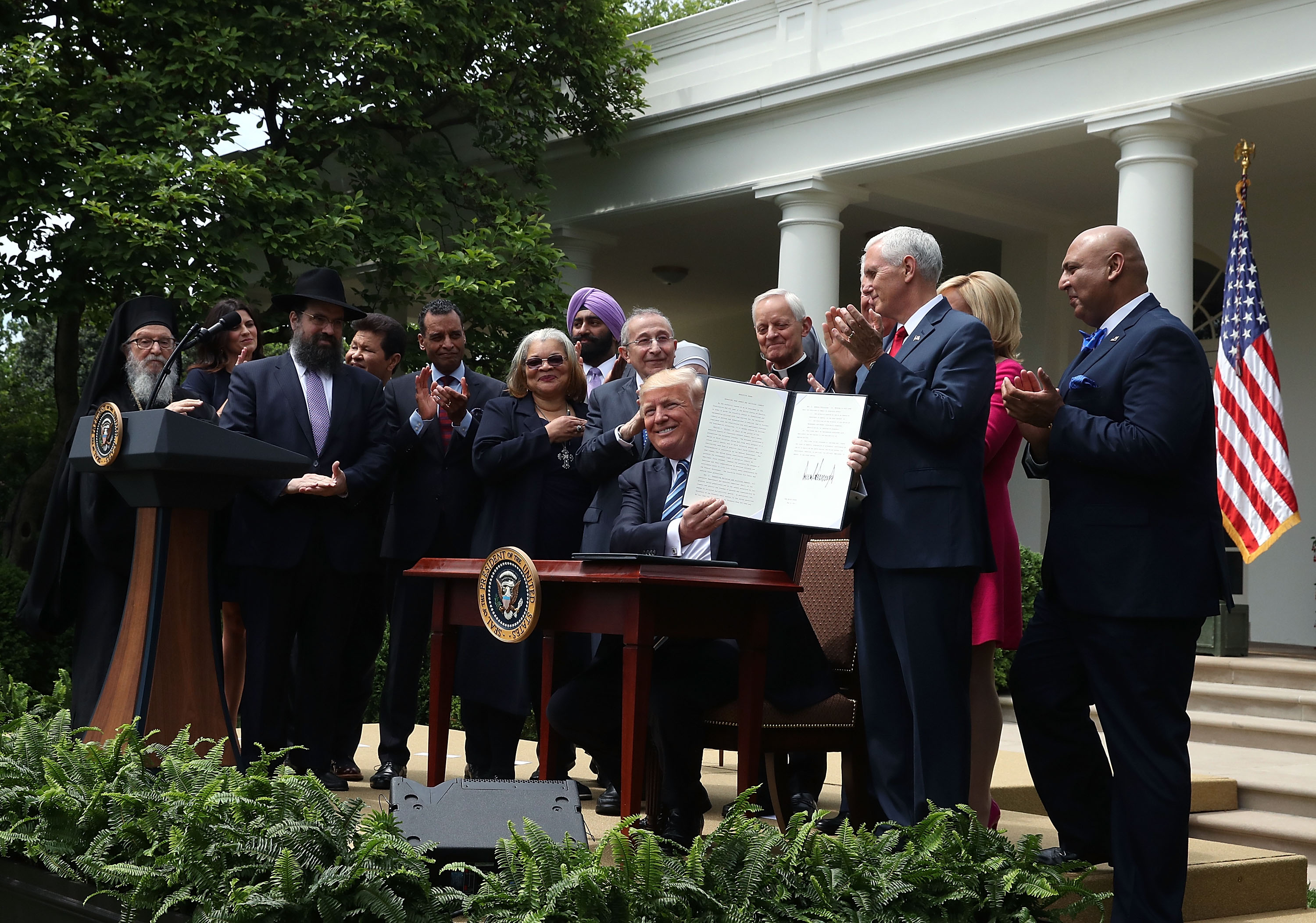How America's faithless president became a defender of the Christian faithful
Many religious voters no longer care about finding virtuous Christian leaders. They’re just seeking refuge under a friendly Roman.


A free daily email with the biggest news stories of the day – and the best features from TheWeek.com
You are now subscribed
Your newsletter sign-up was successful
President Trump rolled out his new religious liberty executive order at the White House on Thursday. And in the process, he revealed some telling tics.
"Come on up here, sister!" Trump called out to a nun from the Little Sisters of the Poor. If that wasn't tonally off enough for the faithful, he later referred to "my cardinals."
It's harmless and humorous, I suppose — but also totally consistent with Trump's framing of religious liberty in a way that maximizes the ability of people of faith to endorse our seemingly faithless president.
The Week
Escape your echo chamber. Get the facts behind the news, plus analysis from multiple perspectives.

Sign up for The Week's Free Newsletters
From our morning news briefing to a weekly Good News Newsletter, get the best of The Week delivered directly to your inbox.
From our morning news briefing to a weekly Good News Newsletter, get the best of The Week delivered directly to your inbox.
When Trump talks about religious issues, he tends to lead with a 1950s provision called the Johnson amendment, barring certain nonprofits from engaging in political campaigns. It has been used to prevent electioneering from the pulpit in churches.
Occasionally, you hear complaints that this is applied unequally between liberal and conservative churches. But pre-Trump, repealing this rule has never been a major ask from the biggest social conservative groups in the country.
Still, there have always been competing tensions within the Christian right. Some want to protect their religious liberty from secular authorities and liberal elites. Some want to elect virtuous leaders and remoralize the culture, if not reclaim it for Christ, as an organization led by the late D. James Kennedy put it.
There has also always been a large group of social conservatives who want to preserve Christian cultural preeminence in an America flush with rising secularism and demographic change. It is this group that is ascendant under Trump.
A free daily email with the biggest news stories of the day – and the best features from TheWeek.com
Trump talks about making it safe to say "Merry Christmas" again. "We're going to protect Christianity," he vowed during the campaign.
This is a major departure from the tone of conservative Christians as recently as under President George W. Bush. Bush, an evangelical Christian himself, spoke in terms of transcendent morality, respecting human rights and dignity because each person is created in the image of God.
There is much to recommend in this vision. Yet Bush often applied it in ways that made it reminiscent of messianic liberalism. Some of his moralism wound up growing government at home. It was also instrumental in some foreign policy disasters abroad.
Trump parts company from Bush on religion in the same place where they differ in their view of America's role in the world. Trump see Christians the way he sees America: disrespected, marginalized, and vilified by outsiders. Just as he wants to reassert America's interests abroad, he wants to defend the honor of the Christians who voted for him at home.
There were sound policy reasons for social conservatives to prefer Trump to Hillary Clinton in 2016. But many of those who most adamantly supported him consciously abandoned the drive to elect virtuous leaders and the focus on character that was used as a cudgel to beat Clinton's husband in the 1990s. These conservatives were no longer primarily interested in electing a good Christian, although they liked Mike Pence and were hopeful Trump was growing in his faith. They were seeking refuge under a friendly Roman, in a culture where they increasingly feel besieged.
Many conservative Christians see themselves as another embattled identity politics group. Trump is their spokesman and defender, regardless of his own sins. And he lives in the White House.
A major problem with this variant of social conservatism is that it become too invested in political power — and wielding that power offensively rather than defensively. That puts conservatives' religious liberty at greater risk when Republicans lose elections.
It also disregards Psalms: Put not your trust in princes.
W. James Antle III is the politics editor of the Washington Examiner, the former editor of The American Conservative, and author of Devouring Freedom: Can Big Government Ever Be Stopped?.
